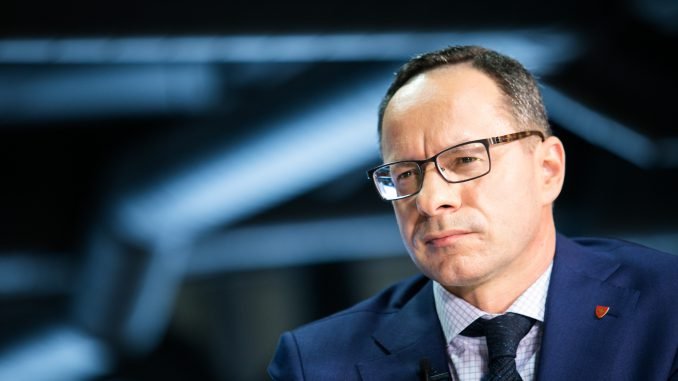
Skilled detractors of the US in Lithuania and anti-American policy-makers bent on seeding discord by sheer mention of the Kremlin are beside themselves with rage as they criticise our President’s meeting in Washington and the barely alleged lack of unity in the region.
Their twisted logic and downright ignorance of basic facts is hardly surprising. This is a tack, I bet, deliberately used to play down our achievements at the historic US-Baltic Centennial Summit where the leaders of the Baltic countries met with US President Donald Trump. After all, Kremlin’s mouthpieces have long been known for the tactics of dissemination of myths, which I feel tempted to dispel.
For one, the summit in Washington took place in record time after the appointment of the new US President. Under Obama‘s administration, such a meeting only took place at the end of his first term in office and following a long courtship with the Kremlin. At the same time, the often lauded Trump’s infatuation with Putin was seasoned with new sanctions to Putin‘s henchmen and, more recently, sweetened by the unprecedented dismissal of Putin’s dearest spies from Washington. What is more, no earlier was Putin invited to Washington than the meeting with the Baltic leaders took place. This sends a strong signal to the Kremlin that Washington will adopt the Baltic approach to its relations with Moscow. The journalists who tried to wheedle a statement on the need for good neighbourly relations with Russia out of President Trump were rebuffed by his retort that good relations with Russia would be a good thing, but may well be a thing of the past.
Secondly, organised on Lithuania’s initiative, the US-Baltic Centennial Summit was carefully coordinated with Washington and the Baltic capitals as well as Warsaw and Kiev. According to sources, the President of Lithuania in particular was invited to represent the interests of Ukraine. This is a strong sign of recovery of our country’s regional leadership. The declaration on liquefied gas exports and regional security, whose text was agreed at the meeting, is a clear signal to Riga and Tallinn to put their heads together with Vilnius, as Washington is very keen on this. The message on nuclear safety is also a clear signal to both Minsk and Riga that the game with Astravyets will come to a dreadful end sooner or later. Of course, the strategy should be continued by calling for the closure of the Astravyets NPP altogether.
But most importantly, this was the first time we gained US commitment to our air defence at such a high level. This is a very important diplomatic victory in the run-up to the forthcoming NATO summit, where, backed by the US, we can ensure support from the entire Alliance and deter the enemy in the area where he has long felt invincible and insolent enough to threaten the global order by nuclear weapons in Kaliningrad.
No less important is the US commitment to Article 5 and regular rotations of US troops on Baltic soil. There had been some fears in the past that Moscow would misinterpret the presence of the US brigade near the Suwałki line. While US soldiers continue their close watch on the area between Belarus and the Kaliningrad region to ensure the security of the Baltic States, the physical presence of US troops on our territory has, no doubt, the best deterrent effect for the Kremlin. Putin is well aware that America will defend all of its troops through and through. Moreover, in this context, instead of getting excited too soon, the current green and red coalition in Lithuania should carefully read the full text of the declaration by Heads of State of the US and the Baltic States, which explicitly refers to the NATO commitment to increased defence expenditure and unambiguous burden-sharing. The Farmers Party would do well to remember that there is no such thing as free lunch, and that we will have to pay for our country’s security and peaceful future for our children. US military assistance to the Baltic countries has always been and will be significant, standing at USD 100 million for this year alone.
Yet another sign of Lithuania’s leadership can be seen in the field of cyber security. We annually fall prey to tens of thousands of online attacks. It has, if anything, long been a war. The US obligation to set up a cyber security centre on a bilateral basis with Lithuania is long-awaited news. We cannot handle threats of such nature alone. The NATO Cooperative Cyber Defence Centre of Excellence in Estonia is doing a lot. However, the US, which has always been the most important actor in this field, here again, acknowledges Lithuania’s leadership. Equally important is US commitment to help the Baltic countries to counter Russian propaganda. Unfortunately, I have some misgivings that the current political leaders will be reproached on this issue in the long run. All they have done so far is limited to mere ‘optimising’ Lithuania’s capacity, while the Americans and the British (and even Brussels) are doing significantly more.
It is important that the US-Baltic Centennial Summit also addressed trade and investment. The US pledged not only to expand trade, but also promote US investment. Notably, Americans are already the leading employers in Lithuania today, in terms of FDI. Simple as it is, the fact is clear: the US investment essentially ends at the Lithuanian border with Latvia, while the Klaipėda seaport is well known for some time now as the most reliable seaport for the largest global logistics companies. Its role is essential, and will continue to be so even in situations of armed conflict.
In conclusion, the US-Baltic Centennial Summit is yet another important victory of the Lithuanian President, on whose initiative the meeting was organised. The Summit resulted in further enhancement of Lithuania’s leadership in economy and regional unity, and led to historical achievements on air defence, military US presence, energy, and cyber security.

Be the first to comment